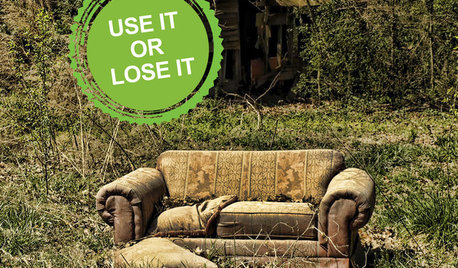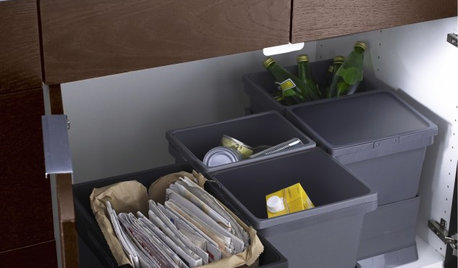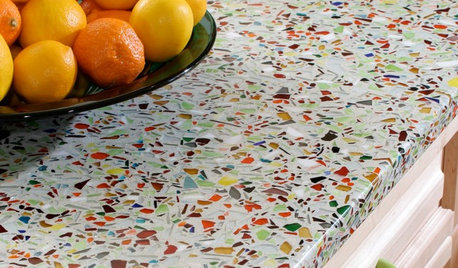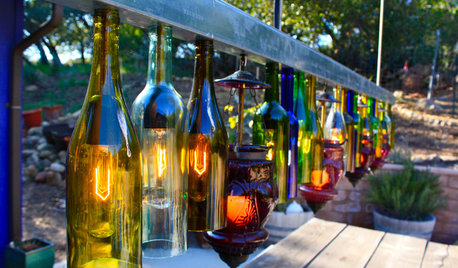My Name is MtnRdRedux and I Do Not Recycle
MtnRdRedux
8 years ago
Featured Answer
Sort by:Oldest
Comments (125)
karin_mt
8 years agoUser
8 years agoRelated Discussions
How can I recycle my leaves?
Comments (12)rosegal, It depends on what you are trying to grow in the bed. If its vegetables or something annual that you will transplant in, the mat formed by the unshredded leaves will still retain moisture and break down to feed your plants. Or if its seeds the mat can be parted in rows for planting. The leaves should be effective in limiting weed growth where they cover the soil. You could also create a leaf-mold bin, a big pile of leaves (potentially contained by wood or wire) that you leave for a couple years to turn into beautiful and nutrient rich planting material. If you have tons of leaves you could get a big leaf shredder/chipper. I got one from Lowes once I figured out that noone else in town wants to keep their leaves. Its more work, but it makes really nice fluffy leave mulch for around my roses and to cover my beds for next year. As for the bad bugs, I would expect that the additional organic matter, stabler soil temperatures, and more constant moisture in your newly leaf-mulched beds will help your plants withstand most bad bug assaults. Remaining bad bug problems will be dealt with by the other wildlife that moves into the more hospitable leaf-mulched environment. Just my thoughts on leaves. Hope it helps. -Kyle...See MoreWhere can I recycle my wood floors?
Comments (12)Dmps-- We had to remove about 300 square feet of wood flooring in part of our last home due to the fact that previous owners had cut floor joists and caused some major issues. Anyhow, we quickly and easily found someone who in order to get the free flooring (and ours was fir in pretty bad shape) was willing to come, remove it all, and take it for their own project. So I second putting it on Craigslist as a free, remove yourself kind of thing. If you're going to pay your floor guys to pull it up it will be even easier to find someone who will want it....See MoreDo I need a filter for my pond? When do I start/stop my bio-filter?
Comments (0)There is often debate over whether it's necessary to filter a pond, and always a few people who claim they have great luck with letting the pond "go natural" with no human interference. A man-made pond, though, is not a natural environment, and will only benefit from some form of filtration or at least aeration. Filtering keeps the water cleansed of organic wastes that can cause cloudy, smelly, murky, or even toxic water. It simplifies maintenance, conserves water by cleansing and recycling it, and can help create "gin-clear" water that allows optimal viewing of the pond and its inhabitants. If you plan on creating a water garden and keeping only plants in the pond, you should be able to get away with little or no filtration, depending upon the type and number of plants you grow. A small pump used with a spitter, fountain, waterfall, or similar feature, should create enough movement to keep the water from stagnating, and diligence in keeping dead plant life from accumulating in the water will help maintain water clarity. However, most people find that, once they've created the pond, they want to add fish, and this is when filtration becomes vital. The more fish you have, the more filtration is necessary to keep the water and the fish healthy. Fish produce ammonia from both their gills and kidneys. Ammonia is also produced from other organic matter decaying in the pond. Whatever the source, ammonia is toxic to fish and must be removed from the water. Frequent water changes and ammonia binding water conditioners will help temporarily, but the addition of a biological filter is the best and easiest way to deal with this toxin. Briefly, a biofilter works by creating a suitable living environment for certain types of bacteria which do the cleaning for you. As pond water is slowly pumped though the biofilter, Nitrosomonas bacteria consume the ammonia, turning it into nitrites (which are also harmful to fish.) Nitrobacter bacteria then oxidizes the nitrites into nitrates, which become food for the plants in your pond. Although these "good bacteria" are present on every surface in your pond, they are not usually there in large enough numbers to reliably cleanse the water of these compounds that are so deadly to fish, and so biofiltration is strongly recommended when there are fish in the pond. Mechanical filtration (that which removes solid waste) is always beneficial, but simply keeping the water clear of solids does not guarantee fish-safe water. Ammonia and nitrites can not be seen except through the use of water test kits. Ideally, water will first pass through some type of mechanical filter that removes solids prior to entering the biofilter, where the toxic compounds are oxidized to nitrates and sent back to the pond where the nitrates will be absorbed by the plants therefore keeping the pond healthy for both your fish and plants. These beneficial bacteria cease to function at temperatures below fifty degrees, so running the biofilter all winter is futile if you're in a cold winter area. The fish will not be eating and producing their usual amount of waste during the winter, so the biofilter will not be needed anyway. Once the autumn temperatures are below 50 degrees Fahrenheit, clean and store the biofilter until spring returns. If you're lucky enough to live in a warm climate, it should be kept running year round. Start the filter up again in the spring as the temperatures get into the upper 40s to low 50s. The nitrogen cycle takes about four to six weeks to establish once the bacteria begin colonizing in the warmer temperatures, so be diligent about testing your water for ammonia and nitrites if the fish are eating. It would take far too many pages to describe here all the types of filters available. Research and ask questions of more experienced ponders, and join several of the informative forums on the Internet. Do not always believe a manufacturer's advertisements, and if tempted to buy something being touted by a salesperson, research it before making an investment. There are many plans for do-it-yourself filters that are simple to make, produce excellent results, and are much less expensive than most of the commercial filters available. And remember - you can never have too large a biofilter! Ronaye, Steve and David...See MoreHow do I get back to "Seniorgal" my long time name on this forum?
Comments (6)Senior girl I found an old posting of yours as suggested above. I am linking it here. I hope you can get back to a facsimile of your original name. Plus I hope you found a more accommodating hairdresser. I would have been out of there at the first sign of disrespect. :-). 12 years ago I know. https://www.gardenweb.com/discussions/2256174/hairdresser-trying-to-get-rid-of-me...See Morebusybee3
8 years agoMtnRdRedux
8 years agorgreen48
8 years agolast modified: 8 years agollitm
8 years agollitm
8 years agoOaktown
8 years agokittymoonbeam
8 years agoMtnRdRedux
8 years agocatspa_NoCA_Z9_Sunset14
8 years agogsciencechick
8 years agolast modified: 8 years agoAnnie Deighnaugh
8 years agoamicus
8 years agoUser
8 years agolast modified: 8 years agogsciencechick
8 years agocatspa_NoCA_Z9_Sunset14
8 years agolast modified: 8 years agoamicus
8 years agotrancegemini_wa
8 years agolast modified: 8 years agoBonnie
8 years agobusybee3
8 years agolast modified: 8 years agobossyvossy
8 years agobossyvossy
8 years agoneetsiepie
8 years agotrancegemini_wa
8 years agoarcy_gw
8 years agoOaktown
8 years agokittymoonbeam
8 years agolast modified: 8 years agoNothing Left to Say
8 years agocatspa_NoCA_Z9_Sunset14
8 years agolast modified: 8 years agotrancegemini_wa
8 years agolast modified: 8 years agocatspa_NoCA_Z9_Sunset14
8 years agolast modified: 8 years agoUser
8 years agorgreen48
8 years agoMtnRdRedux
8 years agocatspa_NoCA_Z9_Sunset14
8 years agolast modified: 8 years agoUser
8 years agotrancegemini_wa
8 years agolast modified: 8 years agocatspa_NoCA_Z9_Sunset14
8 years agolast modified: 8 years agotrancegemini_wa
8 years agolast modified: 8 years agocatspa_NoCA_Z9_Sunset14
8 years agolast modified: 8 years agotrancegemini_wa
8 years agolast modified: 8 years agopatty_cakes42
8 years agoeld6161
8 years agotibbrix
8 years agorgreen48
8 years agolast modified: 8 years agotibbrix
8 years agorgreen48
8 years agolast modified: 8 years agoBumblebeez SC Zone 7
8 years ago
Related Stories

GREEN BUILDINGThe Future of Smart Design: Reuse, Reduce, Recycle
See why reducing waste in a home construction project should appeal to every architect, designer and client
Full Story
DECORATING GUIDESLose It: How to Reuse, Recycle or Replace Your Sofa
Follow these tips and tricks to keep your worn-out couch from ending up in a landfill
Full Story
BEFORE AND AFTERSHouzz TV: See Recycled Walls and Cool Cassette Art in a Woodsy DIY Home
Walnut countertops join hardwood floors and pieces made from leftover framing in a bright Spanish colonial
Full Story
KITCHEN STORAGETake Your Recycling Station From Blah to 'Ahhhh'
Revamp an eyesore setup or just improve recycling efficiency with pullout drawers, stylish containers and innovative solutions
Full Story
KITCHEN DESIGNKitchen Counters: Sturdy, Striking Recycled Glass With Cement
Ecofriendly and full of character, this heat- and scratch-resistant material is a great fit for custom kitchen counters
Full Story
GREEN BUILDINGHow to Recycle Your Kitchen
Instead of adding to the junk pile — and paying landfill fees — get rid of old appliances, cabinets and countertops the ecofriendly way
Full Story
LANDSCAPE DESIGNAdd a Touch of Sparkle With Recycled Glass in the Garden
See 7 practical and versatile ways to use recycled glass in the garden
Full Story
MATERIALSWant a Clear Decorating Conscience? Try Recycled Glass
Choose recycled glass for counters, backsplashes, accessories and more — this material is as durable as it is ecofriendly
Full Story
LOFTSHouzz Tour: A Commercial Laundry Gets Recycled Into a Dramatic Home
See how this 1923 behemoth becomes the ultimate home for entertaining and more
Full Story
KITCHEN DESIGNKitchen Counters: Recycled Paper Surprises With Durability and Warmth
Sturdier than you might think, this postconsumer countertop material also has major environmental cred
Full Story









Sochi